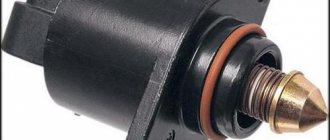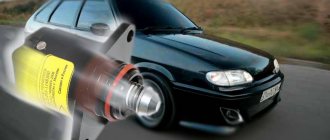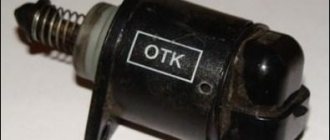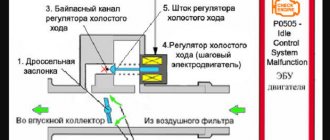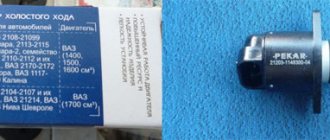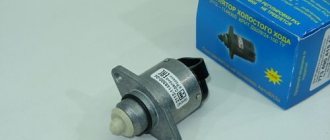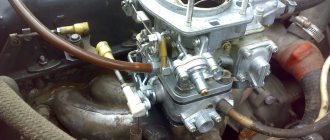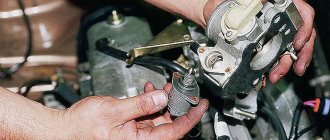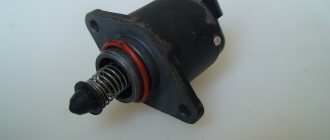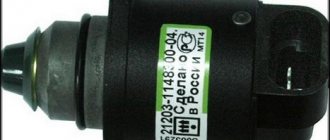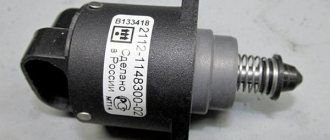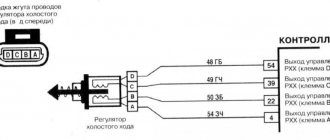The regulator, idle speed sensor Niva-21214 injector is responsible for the cold start of the engine and its operation at low speeds when the gear is off. Previously, on carburetors, these functions were performed by 2 units: an air damper with a cold start membrane and an electric valve with an idle jet.
To some extent, diagnosing malfunctions was easier than after the advent of the electronic fuel control system. Nevertheless, if you wish, you can also understand it in order to detect problems with the regulator and fix them yourself.
Purpose and design
Idle speed sensor
(VAZ “injector” 1.6) is a device that keeps the idle speed of the engine under control.
Replacing the idle speed regulator for Niva VAZ 21213, 21214. With its help, the internal combustion engine can maintain rational modes during operation, thereby increasing the service life of all its components. In addition, idling speeds can warm up the engine to operating temperature during cool periods. Thus, the idle speed sensor (including VAZ 2110) plays an important role in the operation of the car’s internal combustion engine. By the way, it consists of only 3 components:
- Spring.
- Stepper motor.
- A rod with a conical needle at the end.
A more detailed design of this element is shown in the picture below:
Idle speed controller on Shnivy: causes of malfunctions
The device is a specific relay of a special design. The problems may be similar. Usually a part fails due to factors.
- Natural wear and tear. With prolonged use, the mechanism can wear out - the spring weakens, the valve head wears out. It is also possible that the sealing gasket or sealant may crack.
- Mechanical damage. Typically, such problems arise after careless repairs or careless maintenance of the car. The body of the part is plastic and is not designed to withstand shock, severe vibration or shaking.
- Electrical damage. Motorists turn to mechanics with the problem of chafing or damaged wiring. The breakdown is quickly repaired and the car is ready to drive again.
- Software failure of electrical equipment. ECU problems and software errors are included in a separate category. Such problems can only be diagnosed by a scanner and can be eliminated exclusively at the software level.
Signs of trouble
The following signs may indicate a malfunction of the idle speed sensor:
- “Floating” engine speed at idle.
- Poor starting of the internal combustion engine even when the gas pedal is pressed. This is often the reason why the sensor needle is blocking the channel.
- When the car warms up, the engine speed does not increase.
- Sudden engine stop in neutral gear.
- A noticeable drop in speed after turning on energy consumers such as the stove, air conditioner, headlights and radio.
When listing the signs of a malfunction of the idle speed sensor, it should be noted that such “symptoms” can also be caused by other devices (for example, a fuel filter or spark plugs) that are connected to the fuel supply system. How to remove the idle speed control of a VAZ 2121 Niva 2131. Therefore, before changing the idle speed sensor, the VAZ 2110 must be diagnosed to ensure the proper operation of a number of other important parts. Only after making sure that the DX is faulty can you begin to replace it. Otherwise, all the work will not bring the desired result.
Where is the Chevrolet Niva located?
As follows from the description of the principle of operation, the regulator is located on the body of the throttle unit of the power system, at the bottom left in the direction of travel . It is located rather inconveniently, which can create problems when replacing it without a certain skill.
The IAC is placed in the housing socket and secured with two screws . Between the regulator and the body there is a sealing rubber ring that prevents air from leaking around the valve.
A clearly visible sector placed on the throttle axis will help you visually locate the regulator . A cable from the accelerator pedal connects to it, which is clearly visible when looking at the engine from above. There are two sensors located on the side of the throttle assembly opposite the cable. The upper one is on the same axis with the cable sector - this is the throttle position sensor (TPS). And the required IAC stands immediately below it, on the same side.
All VAZ Sensors Location. All VAZ NIVA drivers need to know this. DPS, DMRV, DPKV, DPRV, IAC
In my videos: All sensors and their effect on the engine. What is the idle speed sensor for VAZ, replacement of the speed sensor for VAZ 2110, 21214,. sensor malfunction
and consequences. Company.
Next, we draw the sensor circuit and see if the voltage is suitable for it. For this, a regular voltmeter is used. To determine the voltage, first connect the negative terminal to ground and connect it to the terminal block “A” and “D” (they are often marked on the block). Now turn on the ignition and look at the voltmeter readings: if the voltage on the scale is less than 12 volts, your battery is probably low. If there are no signs of current supply at all, the entire circuit or the electronic control unit is faulty.
If the voltmeter shows a voltage of 12 volts or more, continue the experiment. Turn off the ignition and begin checking the VAZ 2110 idle speed sensor itself. The tester terminals are connected to terminals A, B, C and D. In this case, the total resistance should fluctuate around 50-55 Ohms. Idle speed regulator for the VAZ-21214 engine, its meshes and fuels. Sensor replacement. The idle speed sensor of the VAZ 2114 can be easily changed when... After this, it is necessary to measure the resistance in pairs - its values should be infinitely large. If the idle speed sensor (VAZ 21214, for example) gives different readings, it means it is faulty and needs to be replaced. If the values correspond to the norm, most likely the problem lies in the spark plugs or other elements of the car. In this case, you need to go to a service station for diagnostics.
Site about off-road vehicles, SUVs, off-road vehicles
On Lada Niva cars with VAZ-21213 carburetor engines, there are three most common reasons for the disappearance of idle speed: clogging of the idle jet of the solenoid valve (EMV), burnout of the EMC, lack of power to the EMC.
No idle speed on the VAZ-21213 and VAZ-21214 engines of Lada Niva and Lada 4x4 cars, reasons, checking the EMC solenoid valve and troubleshooting.
Turn on the ignition. Remove the power wire from the solenoid valve. Try touching the power wire terminal to the EMC terminal several times. At the moment of contact, distinct clicks should be heard.
If there are clicks, unscrew the EMC from the carburetor cover. Remove the idle fuel jet from the EMC housing. Pay attention to the center hole of the jet. Remove debris from it using a compressor or air pump, and make sure the hole is clear and clear. It is permissible to clean the nozzle hole with soft copper wire or nylon fishing line. Steel tools cannot be used for this purpose. The calibration of the nozzle will inevitably be disrupted.
Reinstall the fuel jet. Place the EMC in place and screw it in by hand until it stops. Connect the power cord and start the engine. If there are no clicks, then by unscrewing the EMC from the carburetor cover and using an additional piece of wire, apply the “plus” from the battery to the EMC terminal.
Touch the negative terminal of the battery with its body several times. At the moment of contact, a click of the activated valve should be heard. If there are no clicks in this case, the EMC has burned out. Replace it with a working one after checking it first.
If there are clicks, install the EMC in place. Turn on the ignition and check with a tester or test lamp for the presence of a “plus” at the terminal of the EMC power wire. If there is no power, it means that the electronic forced idle control unit has failed.
Converting a faulty solenoid valve to a forced open one.
To get to the nearest auto shop, you can convert a faulty EMC into a forced open one. To do this, remove the idle fuel nozzle, remove the plastic valve tip and core spring and put the nozzle in place. Place the EMC in place and screw it in by hand until it stops. Connect the power cord and start the engine.
Please be aware that using such a valve may cause problems with engine shutdown. It will try to work after the ignition is turned off. In such a situation, try not to turn off the engine immediately, but let it idle for at least 5 minutes. And after turning off the ignition, smoothly press the gas pedal all the way.
Malfunction of the electronic forced idle control unit.
The electronic forced idle control unit cannot be repaired. Replacing it is not difficult, but in order to get to the nearest auto shop, you can temporarily use an additional wire to supply power to the solenoid valve, at least from the “+B” terminal of the ignition coil. As an option, you can connect terminals “4” and “6” in the block of the block wiring harness with a jumper. The numbering order of the terminals is indicated on the block cover to the right and left of the connector - numbers “1” and “7”.
A frequent malfunction of the engine associated with the forced idle block is a significant decrease in rotation speed (up to a complete stop) when the clutch is depressed. For example, when changing gears or stopping at a traffic light. In this case, in order to safely get to a car shop or car service center, it is enough to disconnect the connector of the control circuit of the forced idle unit. Located near the mixture amount adjusting screw.
How to check the DXX for serviceability? Method number 2
You can use an alternative method. To do this, completely remove the idle speed sensor and connect the block to it. Next, by lightly pressing the tip of the DXX needle with your finger, we check how far it has extended. Ideally, a working sensor will fully extend this element when the ignition is turned off. This way your finger should feel a slight jolt. If this does not happen, then the device is faulty and must be replaced. But DXX can be restored, but more on that a little later.
Design features of the Ozone carburetor for Niva 2121
The Ozone carburetor device, suitable for the Niva 2121 all-terrain vehicle, can be of two types:
- With serial number 2107-110-7010-10, it is distinguished by the fact that this carburetor:
- equipped with an old style breaker;
- not equipped with a vacuum corrector.
- With serial number 2107-110-7010-20, the difference is that this device:
- does not have a microswitch from the economizer (it affects fuel consumption and environmental friendliness of emissions).
Common features of the Ozone design of both models include:
- Durable, massive body (thanks to this, the carburetor device is practically not deformed).
- Fuel jets with a large diameter (this involves the use of Ozone for low quality fuel fluid).
- The idle system is equipped with a solenoid-type shut-off valve.
- The second chamber with a throttle valve is pneumatically driven.
- Diaphragm trigger.
- The mechanical control system is equipped with a cable drive, which leads to the air damper of the first chamber.
- Accelerator pump with ball valves.
How to restore the idle speed sensor?
In some cases, in order to restore this part, it is enough to simply clean it thoroughly. Cleaning the sensor itself is a very easy process, and for repairs it is enough to have only WD-40.
So, how to restore the idle speed sensor on a VAZ 2112? At the first stage, the two nuts securing the throttle assembly are unscrewed. The latter, as in the case of replacement, is moved 10 millimeters to the side. Next, the wire block is disconnected from the sensor. WD-40 is applied to a cotton swab, and all channels are thoroughly cleaned with it. Next, use a Phillips screwdriver to unscrew the two bolts that secure the VAZ 2110 idle speed sensor. If there are no fasteners here, then you will have to remove the entire throttle assembly. Next, the mechanism itself is pulled out. If it is covered in oil and black dirt, then in addition to cleaning the throttle body, you will need to clean the entire throttle body.
Next, WD-40 is applied to a conical needle with a spring. Thus, after a few minutes the sensor mechanisms will be cleaned of dirt. Then the device is dried, and it can be safely installed in place. Before installation, check the distance from the needle to the body of the device (one should be 23 millimeters). Idle speed sensor VAZ 2110, 21214, the essence of the idle speed sensor and replacement. At this stage, the idle speed sensor of the VAZ 2115 can be considered successfully repaired. The machine can operate normally again.
So, we found out how the idle speed sensor of the VAZ 2114 (and other models) works. Idle speed sensor VAZ 2114, otherwise the sensor will need to be completely replaced. And how it can be replaced/restored.
Replacing an element
Signs of failure of the idle speed element are very similar to the failure of the throttle position sensor, only in this case the “Check engine” display does not flash on the instrument panel. The car does not start well when cold, is unstable at idle and may stall when coasting. The regulator cannot be repaired; it only needs to be replaced.
The element is replaced in the following order:
- Disconnect all pipes from the throttle body, unscrew and remove this unit. Without this, dismantling the regulator is impossible.
- The element in the form of a barrel with a flange is screwed to the body with 2 screws. Unscrew them and pull out the regulator without losing the gasket.
- Measure the length of the rod on the new element, starting from the flange of the part; it should not exceed 23 mm. If the rod is longer, then you need to retract it, briefly applying a voltage of 12 V to the contacts marked “D” and “C”.
- Wipe the seat with a rag to remove dirt, lubricate the gasket with motor lubricant and install the new regulator in place.
After replacement, you need to install the throttle valve assembly back, connect the pipes and start the engine to check.
How to clean
Often the cause of device failure is contamination. The ingress of dust and the formation of oxides can interfere with signal transmission. Typical cleaning looks like this:
- The contact group of the regulator is opened and the contacts are wiped with a cotton swab dipped in alcohol. This will help remove oxidation and increase network conductivity.
- If the sensor is covered with oil, it should be removed and washed with alcohol. The shut-off valve and spring are additionally processed.
